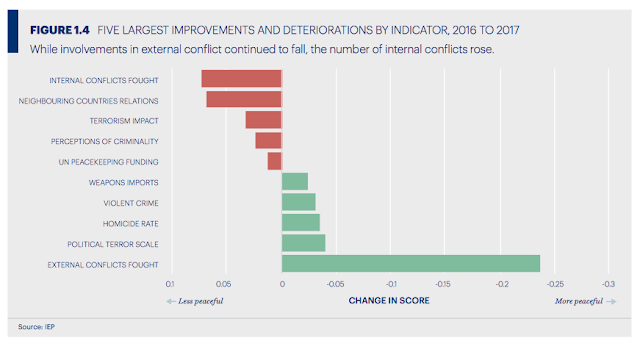The world is more peaceful than 2016 says the Global Peace Index, which
is the first time since the Syrian war began. Not by much – with only and
increase of 0.28%. However peace has declined in America and terrorism records
have increased, the Sydney-based think-tank said. The Institute for Economics
and Peace (IEP) published its Global Peace Index on Thursday 1 June 2017 – it’s
10th annual edition.
IEP researchers said
conflict costs had an enormous impact on economies worldwide. Their report found
that the world became 0.28% more peaceful over the past year, which was driven
by a drop in state-sponsored violence, including torture and extrajudicial
killings, and a decrease in the murder rate.
Ninety-three (93)
countries became more peaceful over the past years and 68 countries became less
peaceful.
The overall trend was
not evident in America, where an increase in murders and a higher level of
perceived crime pushed peacefulness down. Terrorism levels increased across
Europe, but Europe remained the most peaceful region on the planet.
The number of countries
with a record number of deaths from terrorism rose to 23 countries. Among these
were Denmark, Sweden, France, and Turkey. Researchers found that 60% of
countries now have a higher rate of terrorism than they did 10 years ago. The terrorist
attack on Manchester in March in England was not in the report’s timeframe.
Increased support for
populism in Europe corresponded with a deterioration in peacefulness levels,
the report suggested, as wealth inequality rises, media freedoms decrease and
people's acceptance of the rights of others diminishes.
In Colombia, the
ceasefire between the Farc armed group and the government was reflected in
improved scores, notably in the number of deaths from internal conflict, but
the country's peacefulness score was held back by ongoing activity by a smaller
armed group, the ELN.
Researchers used a
multifaceted index of peace indicators. They measured the homicide rate, the
ease of access to weapons, the impact of terrorism and the number of armed
services personnel in the population, among other things.
Syria is the least
peaceful country in the world for the fifth consecutive year. Before the
outbreak of civil war in Syria, it was the 65th least peaceful. Its fall has
been the starkest of the past decade.
The other four most
violent countries are Afghanistan, Iraq, South Sudan, and Yemen. Middle East
and North Africa combined was the least peaceful region in the world.
Iceland remained the
most peaceful country in the world, a position it has occupied since 2008. The
other four most peaceful countries in the world are New Zealand, Portugal,
Austria, and Denmark.
MARTINA NICOLLS is an international
aid and development consultant, and the author of:- Similar But Different
in the Animal Kingdom (2017), The Shortness of Life: A Mongolian Lament
(2015), Liberia’s Deadest Ends (2012), Bardot’s Comet (2011), Kashmir on a
Knife-Edge (2010) and The Sudan Curse (2009).





Comments
Post a Comment